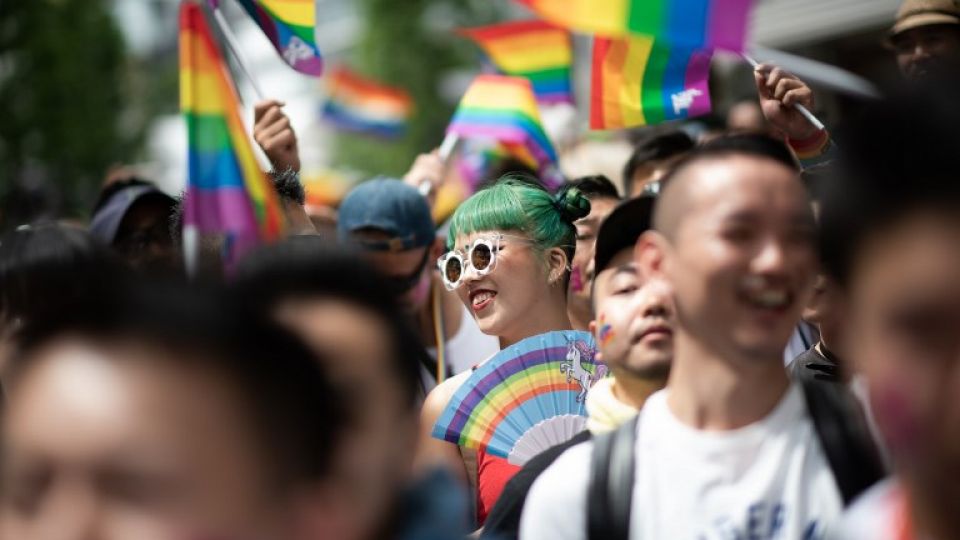June 19, 2018
Japanese companies are increasingly integrating gender diversity policies into their central business strategies.
Japanese companies are increasingly integrating gender diversity policies into their central business strategies, to keep up with the global trend of harnessing the skills and purchasing power of lesbian, gay, bisexual and transgender (LGBT) individuals.
Mizuho Financial Group Inc. last year became Japan’s first banking group to treat loan customers’ same-sex partners as a spouse at Mizuho Bank. The bank also held a life planning seminar exclusively for same-sex couples in May.
Through such efforts, Mizuho aims to boost a variety of financial products for LGBT customers, the group’s managing executive officer Hidenobu Mukai said at an event earlier this month in Tokyo to promote corporate awareness of gender diversity.
“We received quite a big response [to the loan service], which was a fresh reminder of how significant it was as a social issue,” Mukai said.
“By listening to the voices of our customers, we hope to realize more financial services one by one,” he said.
Japan’s domestic market for LGBT customers is growing and is now estimated to be worth about ¥6 trillion, prompting companies to expand their businesses targeting the market. Two nationwide surveys conducted in recent years show about 8 percent of the population consider themselves to be LGBT.
Takeda Pharmaceutical Co. recently moved to a new headquarters with a gender-neutral restroom on each floor. Starting in 2016, the drugmaker has worked to ensure rights for employees who are sexual minorities.
“To promote a true sense of inclusiveness, it’s necessary to focus on what kind of diversity we have, not only on gender differences,” Emiko Akatsu, who is in charge of the firm’s development and organization capability, said at the Tokyo event. It was organized by the Lawyers for LGBT & Allies Network (LLAN), a Tokyo-based advocacy group of lawyers and legal practitioners.
To help LGBT employees pursue career paths and work styles in line with their personal needs, Takeda Pharmaceutical has held sessions to educate its employees on such matters as how to deal with the difficulties sexual minorities face in the workplace. It has also introduced a social media platform where employees who are especially active in helping LGBT colleagues can discuss relevant matters.
Akatsu stressed the importance of raising the awareness of every employee. “Not all of our 7,000 or so employees are on the same level” of understanding LGBT issues, she said.
Overall, however, corporate Japan’s efforts still lag behind those of other industrialized countries. A survey by the Japan Business Federation (Keidanren) last year shows about 90 percent of its member companies and organizations were aware of the need to make efforts on LGBT issues, but less than half of them actually did so.
Under such circumstances, some young LGBT job hunters have had to give up on their occupations of choice and even had job offers revoked, according to Mika Yakushi, a founder of the nonprofit organization Rebit, which supports LGBT job-seekers.
This attitude among companies “could ruin ideal match-ups of skilled individuals with companies,” Yakushi said at the event held at the United Nations University in Tokyo’s Shibuya Ward.
Last year, Keidanren worked out its first guidelines on LGBT issues, proposing actions to be taken, such as allowing applicants to choose whether to indicate their gender on recruitment forms.
At the event, U.N. Assistant Secretary General for Human Rights Andrew Gilmour described Japan as a very “challenging” place for sexual minorities.
“There is no reason why corporate Japan shouldn’t become one of the most welcoming environments [toward LGBT individuals] by the time the [2020 Tokyo] Olympics [and Paralympics] start,” he said. The Olympic Charter articulates prohibition of any kind of discrimination, including that based on sexual orientation.
Yakushi said, “It’s important to work on [LGBT] issues in a sustainable manner, so that 2020 won’t be merely the peak of our activities.”Speech


